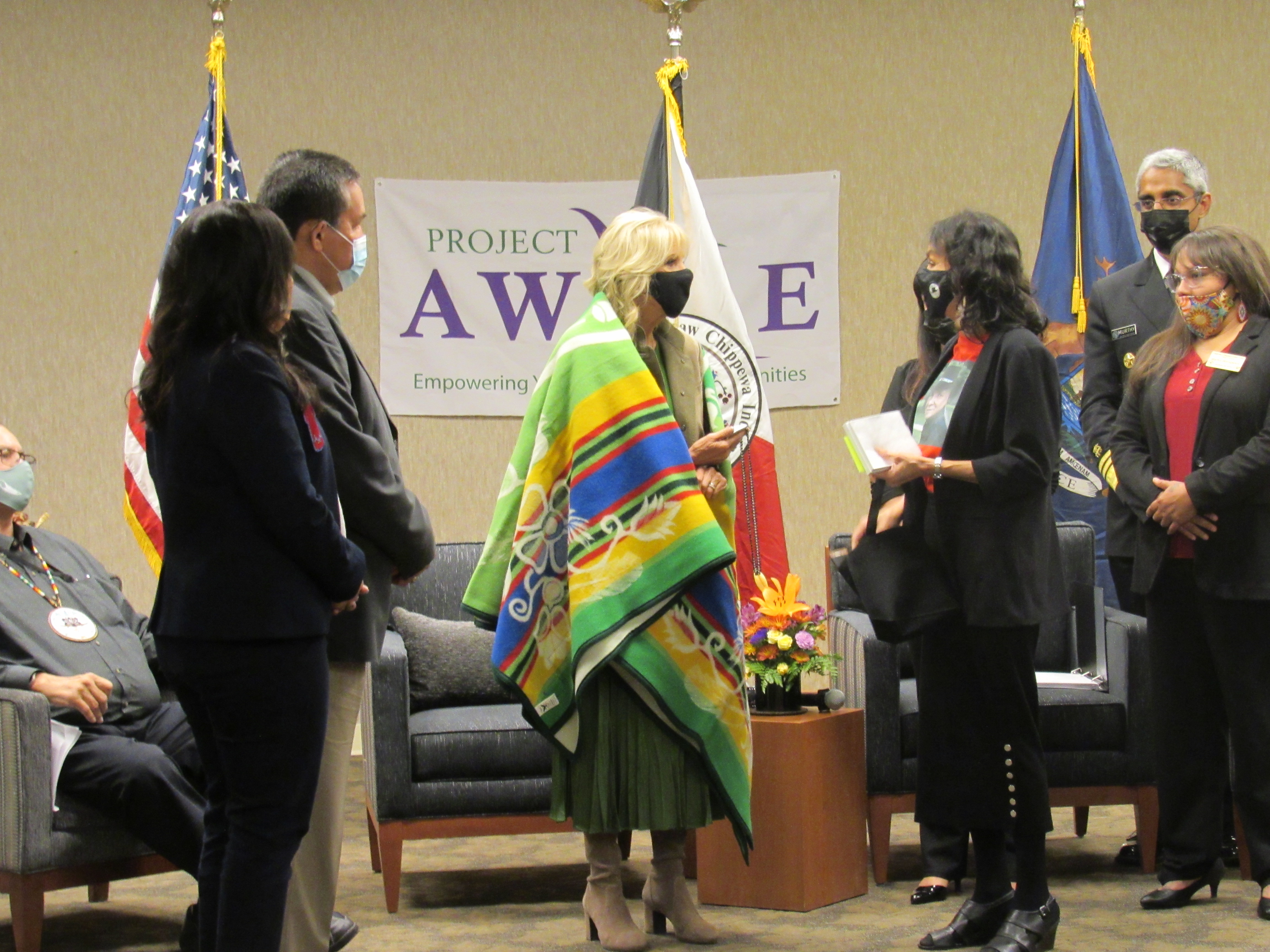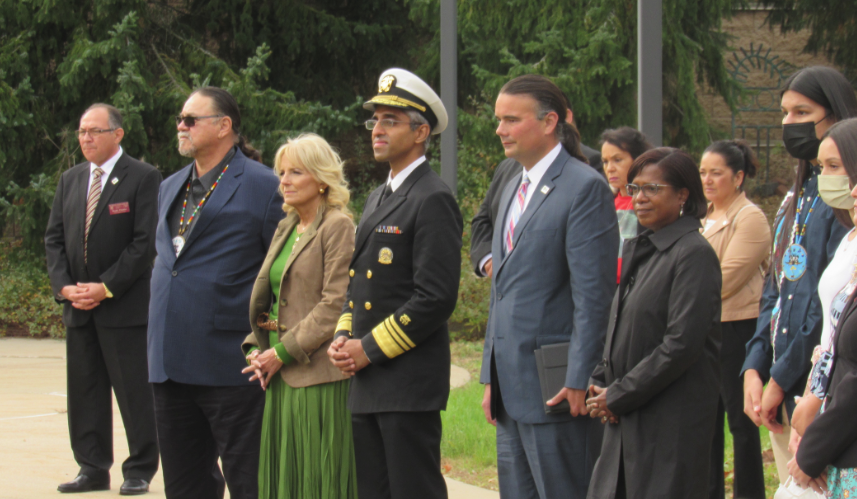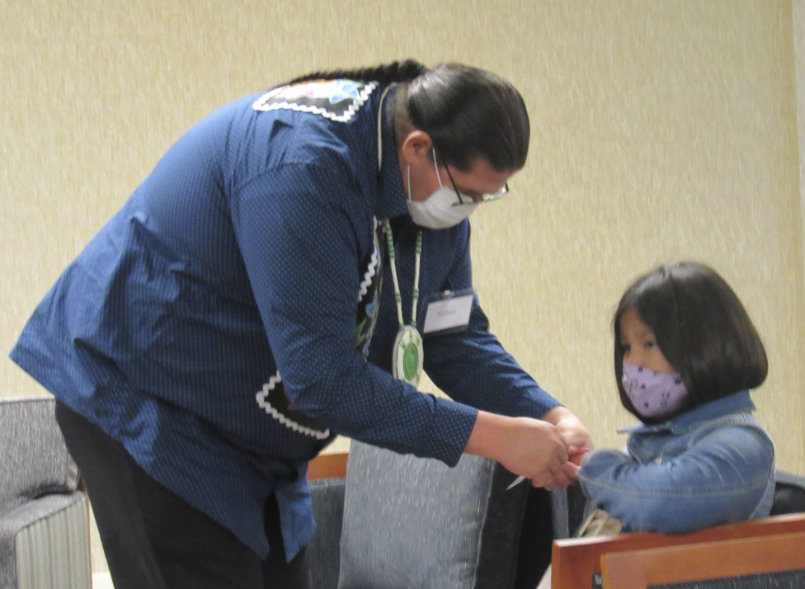
- Details
- By Levi Rickert
ISABELLA INDIAN RESERVATION — First Lady Jill Biden made a visit to the Saginaw Chippewa Indian Tribe’s Ziibiwing Center on the Isabella Indian Reservation on Sunday afternoon. It was her second trip to an Indian reservation since becoming first lady in January. Also part of the first lady’s entourage was Assistant Secretary of the Interior – Indian Affairs Bryan Newland, who is the former leader of the Bay Mills Indian Community.
“I’m a teacher, so I’m looking forward to what the kids have to say,” Biden said, empathizing that as a teacher she knows how difficult it was to go back to school during the pandemic.
Want more Native News? Get the free daily newsletter today.
In addition to wanting to know how Saginaw Chippewa students have adapted to the COVID-19 pandemic, she came to the reservation, with U.S. Surgeon General Vivek Murthy to listen to a panel discuss the success of Project AWARE, which stands for “Advancing Wellness and Resilience in Education.” The Saginaw Chippewa Indian Tribe is in its third year of a five-year, $9 million grant from the U.S. Department of Health and Human Services’ Substance Abuse Mental Health Services Administration (SAMHSA).
Project AWARE creates programs that train educators on how to detect and deal with students who are experiencing trauma in their lives to ensure mental wellness. One component of the project integrates the use of therapy dogs that help to calm students. Another part of the project involves creating quiet spaces in classrooms where teachers and students can go to find relaxation from emotionally charged situations.
To implement the grant, the Saginaw Chippewa Indian Tribe partnered with two surrounding school districts in Mt. Pleasant and Shepherd, as well as its own school, Saginaw Chippewa Academy.

Melissa Isaac, the tribe’s education director, was the person who wrote the grant for the tribe. Isaac recalled her first year of teaching when she discovered some of her Native American second-grade students experienced devastating losses. One student in her class lost her mother to suicide and another's mother died of cancer.
“No one ever prepares you for that first year, especially things that happen—normally—and things that came up that I did not anticipate,” Issac said. “When that was going on, I had no idea on how to help them. I did the best I could with what I knew, which was very little at that time.”
Others on the panel include parents with their children who participated in Project AWARE, along with a teacher from Mt. Pleasant schools and a school counselor from nearby Shepherd Elementary.
Throughout the listening session, both Biden and Murthy listened intently. Towards the end of the 45-minute listening session, Murthy asked the participants what gives them hope. Many of the participants expressed that the hope for their future comes from their family.
“What gives me hope is just having a happy and healthy family; that is what I hope for,” Olivia Meshkowzii, a parent, said.

For Mgizi Wemigwans, a senior at Mount Pleasant High School and co-leader of the Saginaw Chippewa Youth Council, wanting to someday be a leader of his tribe gives him hope.
“I like to think about my future and my friends and my tribe’s future. That is what keeps me going. To do what I want to do like go to college and get a degree, come back to help my tribe. That is what gives me hope,” Wemigwans said.
“What brings me hope is also my family, especially the youth, knowing that they have a bright future…it makes me excited to see what we do next,” Dr. Kehli Henry, Project AWARE Coordinator said.
“It is so easy to focus on a lot of the meanness in the world. What gives me hope is when we sit people down together, like families, like those who love each other and a community that cares for one another, you get beyond what is on the surface from the public with the meanness, it gives me hope that people still care for each other,” Newland said.
“Our mental health problem is so great and the needs are so great, especially after this pandemic,” the First Lady shared. “I knew Joe would see that and come up with this plan to give more money to mental health, and that’s what he pledged to do. That’s what gives me hope - that our nation is starting to heal.”
After the conclusion of the listening session, members of the Saginaw Chippewa Indian Tribe’s tribal council presented Biden with a blanket with the tribe’s logo on it. They wrapped First Lady Biden in the blanket. Issac presented the first lady with a beaded necklace, a strawberry black-ash basket and a ribbon skirt.
Across the street from the Ziibwing Center were tribal citizens holding signs welcoming Biden to their reservation and one block away some protesters carried anti-vaccination signs.
More Stories Like This
Native News Weekly (August 25, 2024): D.C. BriefsNavajo Nation Mourns the Passing of Former Vice President Rex Lee Jim
Deb Haaland Earns Endorsement From Communications Workers of America Local 7076
University Soccer Standout Leads by Example
Two Native Americans Named to Democratic Congressional Campaign Committee's“Red to Blue” Program
Help us defend tribal sovereignty.
At Native News Online, our mission is rooted in telling the stories that strengthen sovereignty and uplift Indigenous voices — not just at year’s end, but every single day.
Because of your generosity last year, we were able to keep our reporters on the ground in tribal communities, at national gatherings and in the halls of Congress — covering the issues that matter most to Indian Country: sovereignty, culture, education, health and economic opportunity.
That support sustained us through a tough year in 2025. Now, as we look to the year ahead, we need your help right now to ensure warrior journalism remains strong — reporting that defends tribal sovereignty, amplifies Native truth, and holds power accountable.
 The stakes couldn't be higher. Your support keeps Native voices heard, Native stories told and Native sovereignty defended.
The stakes couldn't be higher. Your support keeps Native voices heard, Native stories told and Native sovereignty defended.
Stand with Warrior Journalism today.
Levi Rickert (Potawatomi), Editor & Publisher

